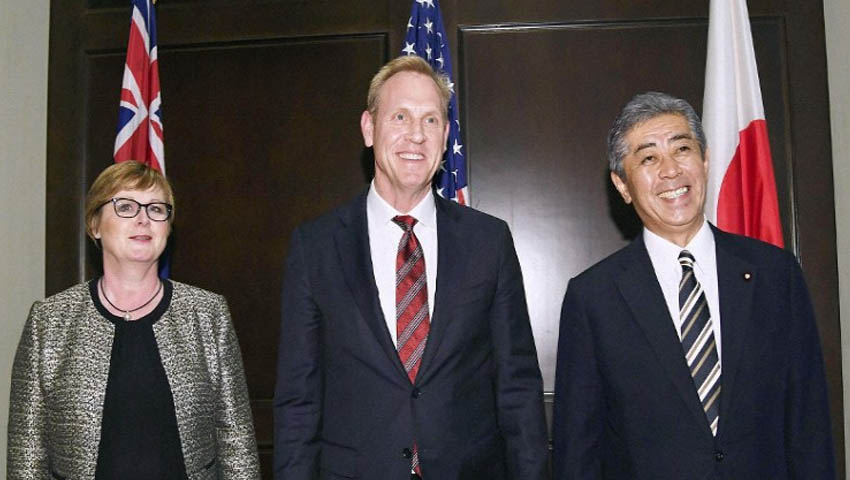Defence Minister Linda Reynolds has joined her Japanese counterpart, Minister of Defense Takeshi Iwaya, and US acting Secretary of Defense Patrick Shanahan to convene a trilateral defence ministerial meeting in Singapore on 1 June on the margins of the 18th International Institute for Strategic Studies (IISS) Asia Security Summit (2019 Shangri-La Dialogue).
The ministers were united in their shared commitment to do more together in support of security, stability and prosperity in the Indo-Pacific region. This was the eighth meeting among the three nations’ defence leaders.
The ministers affirmed their shared vision for an Indo-Pacific region that is open, inclusive, rules based and respectful of sovereignty, where disputes are resolved peacefully and free of coercion. The ministers recognised the importance of supporting Association of South East Asian Nations-led regional architecture and their support for ASEAN centrality, which has played an instrumental role in establishing norms of behaviour and habits of co-operation in the region.
The Australian and Japanese ministers welcomed the United States Indo-Pacific Strategy Report announced by Secretary Shanahan. The ministers agreed to continue to closely co-ordinate support to the region to maximise the benefits of their national and combined engagement activities in the region in a transparent, efficient and effective manner under their shared strategic vision.
The ministers underscored the importance of the international community’s ongoing commitment to achieving North Korea’s abandonment of all of its weapons of mass destruction, ballistic missiles, and related programs and facilities in a complete, verifiable and irreversible manner in accordance with relevant United Nations Security Council resolutions.
The ministers welcomed the US’ and Republic of Korea’s diplomatic efforts to achieve the final, fully verified denuclearisation of North Korea and called on North Korea to return to negotiations with the US towards this goal.
Additionally, the ministers expressed strong opposition to the use of any coercive unilateral actions that seek to alter the status quo or increase tensions in the East China Sea. They also expressed their intention to remain in close contact on the security situation in that area with a view to deter such actions.
The trilateral dialogue was also used to reaffirm the joint 'Australia-Japan-United States Strategic Action Agenda', which affirms the alignment of the three nations' strategic interests and universal principles, including a commitment to democracy, human rights, free trade, and the rules-based international order. Together, the three countries recognise the importance of enhancing engagement with our Indo-Pacific partners, in order to foster regional prosperity, resilience and transparency in a time of geostrategic change.
The trilateral relationship complements the strong and effective bilateral defence relationships between each of the three countries, and enables us to pool our resources in support of peace, security and prosperity in the Indo-Pacific region.
The three defence ministers are committed to advancing trilateral co-operation, enhancing engagement with like-minded partners in the region, and reinforcing the rules-based global order through actively supporting key regional security and defence architectures.
This Strategic Action Agenda articulates their vision for trilateral activities, and their commitment to work both trilaterally and together with regional partners. To that end, Australia, Japan and the US intend to pursue the following lines of effort:
- Strengthen trilateral co-operation in the areas of maritime security, humanitarian assistance and disaster relief, peacekeeping, counter-terrorism, amphibious activities, and non-conventional domains like space, cyber space and the electromagnetic spectrum.
- In close collaboration with regional partners, identify and co-ordinate opportunities to build partner capacity through regular information sharing, complementary programs and co-operative activities.
- Increase the complexity and sophistication of trilateral exercises to enhance interoperability, build common understanding, and better enable the defence forces to work together to contribute to peace and security in the Indo-Pacific region.
- Promote transparency, regional co-operation and the rule of law through port visits and other defence-related activities that demonstrate every nation’s right to freedom of navigation and overflight, in accordance with international law.
- Improve common understanding and shared regional situational awareness through enhanced trilateral information sharing.
The three defence ministers committed to identifying new opportunities to further trilateral co-operation, with the objectives of maintaining and promoting a free, open, stable and prosperous Indo-Pacific region.


